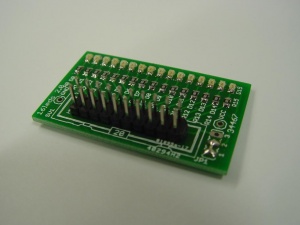Difference between revisions of "16 LEDs"
Jump to navigation
Jump to search
| Line 11: | Line 11: | ||
=== Possible Configurations === |
=== Possible Configurations === |
||
To test the 16LED, connect the device to any of the power pins on the boards. |
To test the 16LED, connect the device to any of the GND and power pins on the boards. |
||
For example if you have a combination of the DIO and the 16LED (common GND), connect DIO-PIN1 to 16LED-PIN1 and DIO-PIN2 to 16LED-<b>PIN3</b> to light LED0 as DIO-PIN2 is VCC (5V). |
For example if you have a combination of the DIO and the 16LED (common GND), connect DIO-PIN1 to 16LED-PIN1 and DIO-PIN2 to 16LED-<b>PIN3</b> to light LED0 as DIO-PIN2 is VCC (5V). |
||
Revision as of 16:45, 24 April 2013
This is the documentation page for the 16-LEDs board.
Overview
A very useful board to test your digital outputs. Works on 5V as well as 3.3V so for the DIO as well as the Pi GPIO pins. Must have! Use the 10x1Pin F-F kabel to hook it up to the boards.
Assembly instructions
No user adjustable settings.
Possible Configurations
To test the 16LED, connect the device to any of the GND and power pins on the boards. For example if you have a combination of the DIO and the 16LED (common GND), connect DIO-PIN1 to 16LED-PIN1 and DIO-PIN2 to 16LED-PIN3 to light LED0 as DIO-PIN2 is VCC (5V).
External resources
Related projects
| pin | function | ||
|---|---|---|---|
| 1 | 2 | GND | GND |
| 3 | 4 | LED1 | LED2 |
| 5 | 6 | LED3 | LED4 |
| 7 | 8 | LED5 | LED6 |
| 9 | 10 | LED7 | LED8 |
| 11 | 12 | LED9 | LED10 |
| 13 | 14 | LED11 | LED12 |
| 15 | 16 | LED13 | LED14 |
| 17 | 18 | LED15 | LED16 |
| 19 | 20 | VCC | VCC |
Common Ground/Common VCC is hard wired in JP1.
| 1=2 3 | Common GND |
| 1 2=3 | Common VCC |
Jumper settings
Future hardware enhancements
Changelog
2.0
- Initial public release
